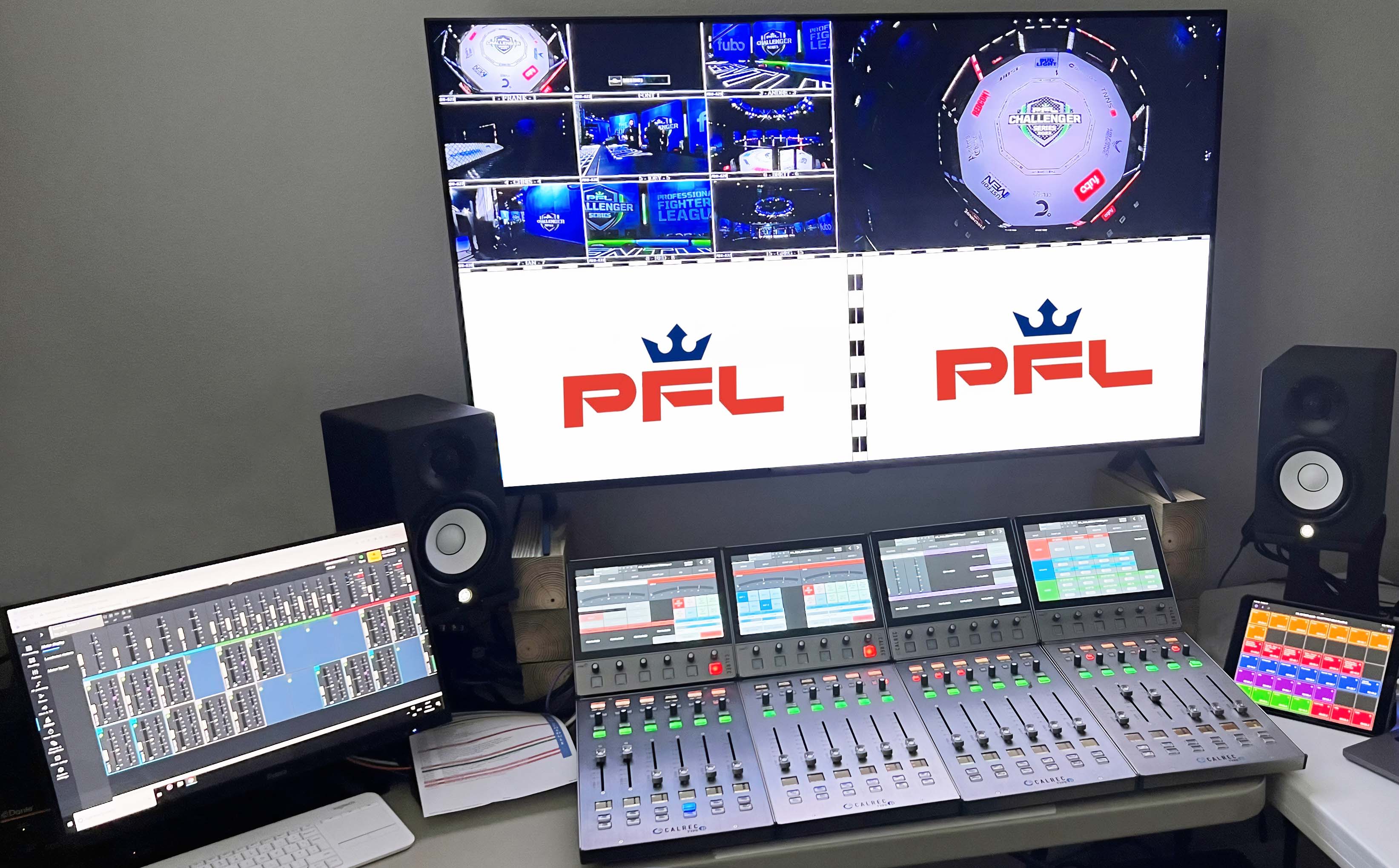Universal Remote.tv Deploys Calrec’s Type R to Test Remote Mixing
Calrec’s IP-based, compact form factor Type R was used for a remote mixing proof of concept production of the Professional Fighters League

HEBDEN BRIDGE, U.K.—Universal Remote.tv is reporting that it recently concluded a successful remote mixing proof of concept (POC) with the Professional Fighters League using Calrec’s IP-based, compact form factor Type R.
Universal Remote.TV was set up by A1 and Audio Network Engineer Sean O’Gorman and A1 Shawn Peacock who set up the test to address a growing issue across the industry.
“One of the results of the pandemic has been [that] many entities have built out regional ‘pod’-based production facilities to handle remote productions (REMI) across the US and world,” O’Gorman said. “One issue with these facilities has been finding high-quality, experienced audio engineers at a competitive pay scale to handle the massive number of events they have to cover – think Regional Sports Networks (RSNs). Often, the inexperience of ‘local’ engineers has led to networks having to fly in experienced engineers into these remote facilities. This is not optimal for either party. Currently, the REMI model isn’t working properly.”
To address that issue, Universal Remote.TV turned to MMA event producers Professional Fighters League (PFL), with whom they have been providing a range of audio mixing, network and equipment services for a number of years. Universal Remote.tv proposed that PFL get involved in a proof of concept to show how remote mixing – leaving the overall transmission chain unaffected – could solve the talent problem faced by many productions. In essence, they posed the question of how to bring the audio mixing capabilities of the OB truck to the engineer.
PFL agreed to let them trial this on the world feed of its recent pre-season build-up event held at Universal Studios, Fla., from late January to late February.
Universal Remote.tv then approached Calrec for the technology to carry out this proof of concept (POC).
Peacock explained that “we really wanted to work with Calrec because its technology is in 99 percent of the trucks in the US and they are innovative, tried and trusted and rock solid. Crucial to this is the technology form factor of the Type R so it’s economically viable to ship the control surfaces to wherever the A1 is, with the core in the OB truck, which they can then set up in a control room in their house. This is coupled with the fact that it’s IP based, of course. The Type R really fits this bill as its compact and modular, allowing us to keep all the DSP at the OB truck onsite and then feed the control signals from the A1’s property to the truck.”
Get the TV Tech Newsletter
The professional video industry's #1 source for news, trends and product and tech information. Sign up below.
Universal Remote.tv stressed the fact that they’re not shipping the audio signals to a console remotely – the audio is not leaving the site: this is about control signals. The only audio that has to come to the A1 is what hits their monitors and these control signals do not affect transmission.
For this POC, Calrec provided some Type R control surfaces. Because the Type R is modular, it’s a “couple of Pelicans with a couple of fader panels/LSPs and some cables," explained O’Gorman. "There’s a router, a POE (pow It’s a very minimal setup. er-over-Ethernet) switch and then plug it in and go and an A1 is online via our Universal Remote.tv-developed VPN."
For this POC, the Type R was integrated on Universal Remote.tv’s network over DANTE. Everything that went in and out of the Type R core was on a DANTE network. A low latency WAN-friendly codec is used to ship the control room output of that core to the Engineer at their house – in this POC, that was Shawn Peacock. Just like in a truck, they are listening to whatever is routed via the console to the Control Room monitors. The latency is fixed with Universal Remote.tv setting it at 175ms - that’s the delay between an A1 selecting the source and hearing it. This is all going over the public internet with a VPN sitting on top.
“Being able to do this using public internet rather than dedicated connectivity is a huge boon,” O’Gorman said.
“We are maximizing the time engineers are able to practice their craft and provide them with the tools to take full advantage of the product they deliver,” he concluded. “On Monday and Tuesday, for example, they could be mixing a dog show out of New York and on Wednesday and Thursday they could be mixing a college basketball game in L.A. We want to maximize the time experienced engineers are sitting behind a console and minimize the time they’re sitting on a plane. Our goal is to bring the work, tools and resources to experienced A1s and ‘swing’ the shows to them, and this POC shows how well this works. The modularity and flexibility of the Type R is very well suited for this and the support of both Calrec and PFL has been invaluable across this project.”
George Winslow is the senior content producer for TV Tech. He has written about the television, media and technology industries for nearly 30 years for such publications as Broadcasting & Cable, Multichannel News and TV Tech. Over the years, he has edited a number of magazines, including Multichannel News International and World Screen, and moderated panels at such major industry events as NAB and MIP TV. He has published two books and dozens of encyclopedia articles on such subjects as the media, New York City history and economics.

